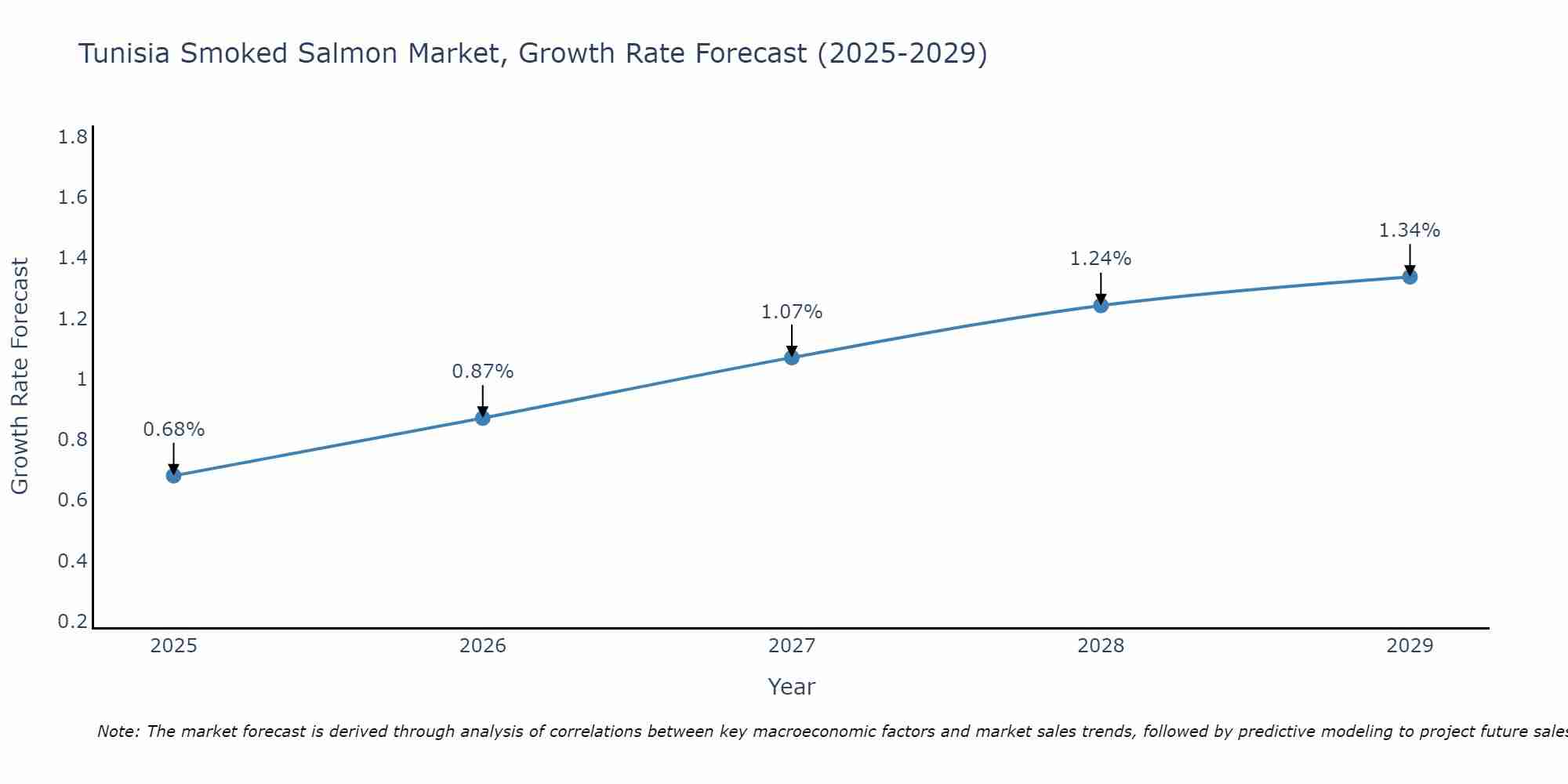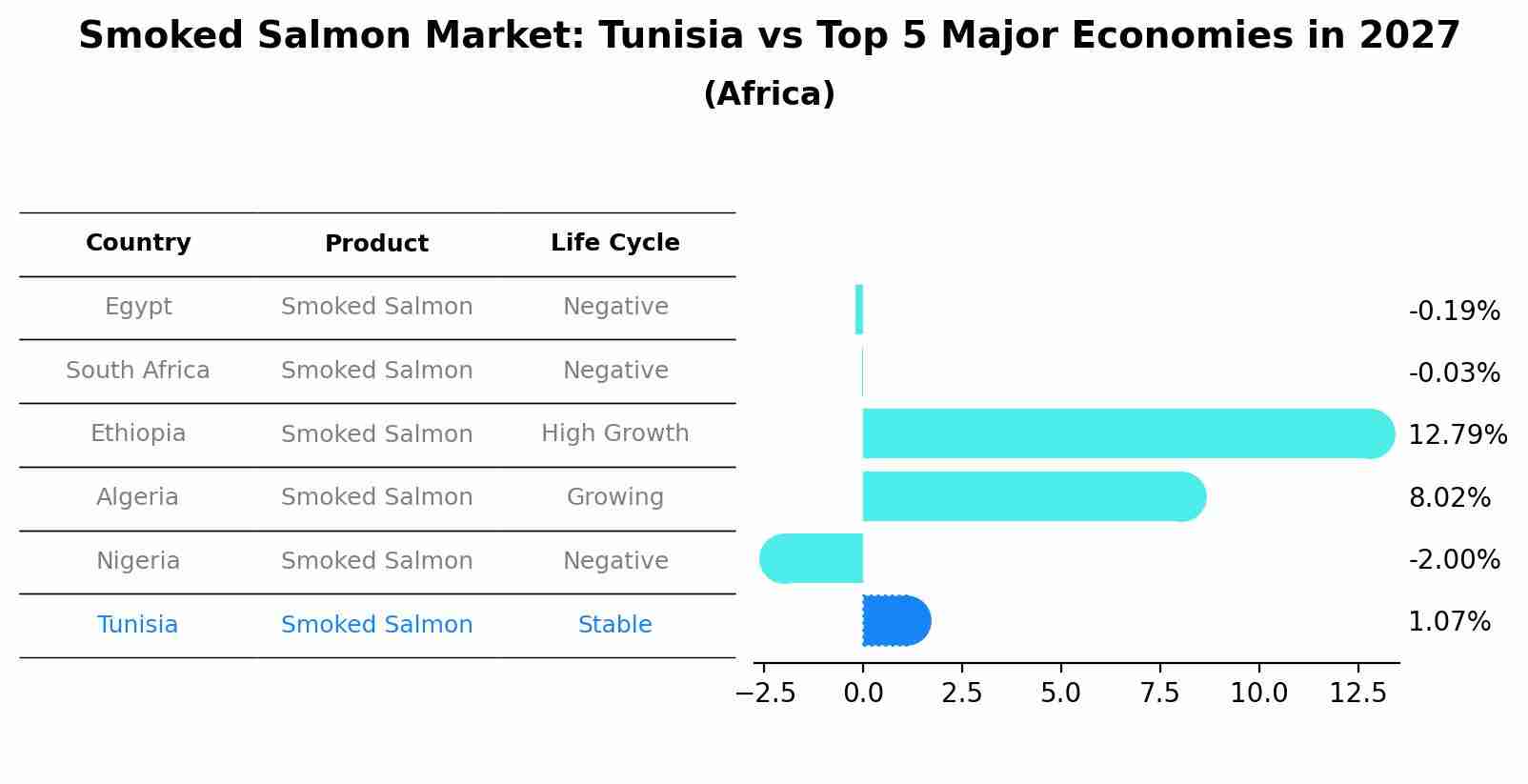Tunisia Smoked Salmon Market (2025-2031) Outlook | Revenue, Growth, Forecast, Share, Industry, Analysis, Size, Value, Trends, Companies
| Product Code: ETC387894 | Publication Date: Aug 2022 | Updated Date: Jul 2025 | Product Type: Market Research Report | |
| Publisher: 6Wresearch | Author: Dhaval Chaurasia | No. of Pages: 75 | No. of Figures: 35 | No. of Tables: 20 |
Tunisia Smoked Salmon Market Size Growth Rate
The Tunisia Smoked Salmon Market is poised for steady growth rate improvements from 2025 to 2029. From 0.68% in 2025, the growth rate steadily ascends to 1.34% in 2029.

Smoked Salmon Market: Tunisia vs Top 5 Major Economies in 2027 (Africa)
Tunisia's Smoked Salmon market is anticipated to experience a stable growth rate of 1.07% by 2027, reflecting trends observed in the largest economy Egypt, followed by South Africa, Ethiopia, Algeria and Nigeria.

Tunisia Smoked Salmon Market Synopsis
The Tunisia Smoked Salmon Market is experiencing steady growth driven by increasing consumer demand for premium seafood products. Smoked salmon is gaining popularity among Tunisian consumers due to its perceived health benefits and versatile usage in various cuisines. Key players in the market are focusing on product innovation, packaging enhancements, and expanding distribution channels to reach a wider customer base. The market is characterized by intense competition, with both local and international brands vying for market share. Factors such as rising disposable incomes, changing dietary preferences, and a growing foodservice industry are contributing to the positive outlook for the Tunisia Smoked Salmon Market. Overall, the market shows promising growth potential and opportunities for further expansion in the foreseeable future.
Tunisia Smoked Salmon Market Trends
The Tunisia Smoked Salmon Market is experiencing a growing demand for premium and high-quality smoked salmon products. Consumers are increasingly seeking healthier and more diverse food options, with smoked salmon being perceived as a nutritious and versatile choice. There is a trend towards sustainable sourcing and production methods, with consumers showing a preference for products that are ethically sourced and environmentally friendly. Additionally, the market is witnessing an increase in the availability of flavored and seasoned smoked salmon varieties to cater to evolving consumer tastes. Overall, the Tunisia Smoked Salmon Market is expected to continue its growth trajectory driven by changing consumer preferences towards healthier and sustainable food options.
Tunisia Smoked Salmon Market Challenges
In the Tunisia Smoked Salmon Market, challenges include limited consumer awareness and familiarity with smoked salmon products, resulting in lower demand compared to other more traditional seafood options. Additionally, high import costs for quality salmon can drive up prices, making it less affordable for the average Tunisian consumer. Distribution and logistics issues may also pose challenges, as ensuring the freshness and quality of smoked salmon products can be difficult in a market with limited infrastructure. Finally, competition from other protein sources, such as locally sourced fish and meat products, further complicates the market landscape for smoked salmon producers in Tunisia. Addressing these challenges will require targeted marketing efforts to educate consumers, strategic sourcing practices to manage costs, and efficient distribution channels to ensure product availability and quality.
Tunisia Smoked Salmon Market Investment Opportunities
The Tunisia Smoked Salmon market presents several investment opportunities for potential investors. With an increasing demand for high-quality and healthy seafood products in the region, there is a growing market for premium smoked salmon. Investing in modern processing facilities and technology to improve production capacity and quality control could provide a competitive edge. Additionally, focusing on sustainable sourcing practices and certifications could appeal to environmentally conscious consumers. Collaborating with local fisheries and suppliers to ensure a steady supply chain can also be a strategic investment. Furthermore, diversifying product offerings to include value-added smoked salmon products, such as flavored varieties or ready-to-eat options, could cater to a wider consumer base and enhance profitability in the market.
Jordan Agar Market Government Policies
Government policies related to the Tunisia Smoked Salmon Market focus on ensuring food safety, quality standards, and sustainable practices. The Ministry of Agriculture, Water Resources, and Fisheries is responsible for regulating the production, processing, and distribution of smoked salmon to ensure compliance with hygiene and safety standards. Additionally, there are regulations in place to monitor the use of additives, preservatives, and labeling requirements to protect consumer interests. The government also supports initiatives to promote sustainable fishing practices and aquaculture to ensure the long-term viability of the smoked salmon industry in Tunisia. Overall, the government policies aim to create a conducive environment for the growth of the smoked salmon market while safeguarding public health and environmental sustainability.
Tunisia Smoked Salmon Market Future Outlook
The future outlook for the Tunisia Smoked Salmon Market appears promising as consumer interest in premium and healthy seafood products continues to grow. With increasing awareness about the health benefits of salmon, including its high protein and omega-3 fatty acids content, demand for smoked salmon is expected to rise. Additionally, the trend towards convenience and ready-to-eat products is likely to drive market growth, as smoked salmon is a popular choice for quick and nutritious meals. The market may also benefit from expanding distribution channels and marketing efforts to reach a wider audience. Overall, the Tunisia Smoked Salmon Market is anticipated to experience steady growth in the coming years, presenting opportunities for both domestic producers and international suppliers to capitalize on this evolving consumer trend.
Key Highlights of the Report:
- Tunisia Smoked Salmon Market Outlook
- Market Size of Tunisia Smoked Salmon Market, 2024
- Forecast of Tunisia Smoked Salmon Market, 2031
- Historical Data and Forecast of Tunisia Smoked Salmon Revenues & Volume for the Period 2021 - 2031
- Tunisia Smoked Salmon Market Trend Evolution
- Tunisia Smoked Salmon Market Drivers and Challenges
- Tunisia Smoked Salmon Price Trends
- Tunisia Smoked Salmon Porter's Five Forces
- Tunisia Smoked Salmon Industry Life Cycle
- Historical Data and Forecast of Tunisia Smoked Salmon Market Revenues & Volume By Type for the Period 2021 - 2031
- Historical Data and Forecast of Tunisia Smoked Salmon Market Revenues & Volume By Vac/Vacuum Packing for the Period 2021 - 2031
- Historical Data and Forecast of Tunisia Smoked Salmon Market Revenues & Volume By Vac/Vacuum Packing Covered With Cardboard Envelope for the Period 2021 - 2031
- Historical Data and Forecast of Tunisia Smoked Salmon Market Revenues & Volume By Canned Packaging for the Period 2021 - 2031
- Historical Data and Forecast of Tunisia Smoked Salmon Market Revenues & Volume By Application for the Period 2021 - 2031
- Historical Data and Forecast of Tunisia Smoked Salmon Market Revenues & Volume By Food Service Sector for the Period 2021 - 2031
- Historical Data and Forecast of Tunisia Smoked Salmon Market Revenues & Volume By Retail Sector for the Period 2021 - 2031
- Tunisia Smoked Salmon Import Export Trade Statistics
- Market Opportunity Assessment By Type
- Market Opportunity Assessment By Application
- Tunisia Smoked Salmon Top Companies Market Share
- Tunisia Smoked Salmon Competitive Benchmarking By Technical and Operational Parameters
- Tunisia Smoked Salmon Company Profiles
- Tunisia Smoked Salmon Key Strategic Recommendations
Frequently Asked Questions About the Market Study (FAQs):
- Single User License$ 1,995
- Department License$ 2,400
- Site License$ 3,120
- Global License$ 3,795
Search
Thought Leadership and Analyst Meet
Our Clients
Related Reports
- Afghanistan Apparel Market (2026-2032) | Growth, Outlook, Industry, Segmentation, Forecast, Size, Companies, Trends, Value, Share, Analysis & Revenue
- Canada Oil and Gas Market (2026-2032) | Share, Segmentation, Value, Industry, Trends, Forecast, Analysis, Size & Revenue, Growth, Competitive Landscape, Outlook, Companies
- Germany Breakfast Food Market (2026-2032) | Industry, Share, Growth, Size, Companies, Value, Analysis, Revenue, Trends, Forecast & Outlook
- Australia Briquette Market (2025-2031) | Growth, Size, Revenue, Forecast, Analysis, Trends, Value, Share, Industry & Companies
- Vietnam System Integrator Market (2025-2031) | Size, Companies, Analysis, Industry, Value, Forecast, Growth, Trends, Revenue & Share
- ASEAN and Thailand Brain Health Supplements Market (2025-2031) | Strategy, Consumer Insights, Analysis, Investment Trends, Opportunities, Growth, Size, Share, Industry, Revenue, Segments, Value, Segmentation, Supply, Forecast, Restraints, Outlook, Competition, Drivers, Trends, Demand, Pricing Analysis, Competitive, Strategic Insights, Companies, Challenges
- ASEAN Bearings Market (2025-2031) | Strategy, Consumer Insights, Analysis, Investment Trends, Opportunities, Growth, Size, Share, Industry, Revenue, Segments, Value, Segmentation, Supply, Forecast, Restraints, Outlook, Competition, Drivers, Trends, Demand, Pricing Analysis, Competitive, Strategic Insights, Companies, Challenges
- Europe Flooring Market (2025-2031) | Outlook, Share, Industry, Trends, Forecast, Companies, Revenue, Size, Analysis, Growth & Value
- Saudi Arabia Manlift Market (2025-2031) | Outlook, Size, Growth, Trends, Companies, Industry, Revenue, Value, Share, Forecast & Analysis
- Uganda Excavator, Crane, and Wheel Loaders Market (2025-2031) | Strategy, Consumer Insights, Analysis, Investment Trends, Opportunities, Growth, Size, Share, Industry, Revenue, Segments, Value, Segmentation, Supply, Forecast, Restraints, Outlook, Competition, Drivers, Trends, Demand, Pricing Analysis, Competitive, Strategic Insights, Companies, Challenges
Industry Events and Analyst Meet
Whitepaper
- Middle East & Africa Commercial Security Market Click here to view more.
- Middle East & Africa Fire Safety Systems & Equipment Market Click here to view more.
- GCC Drone Market Click here to view more.
- Middle East Lighting Fixture Market Click here to view more.
- GCC Physical & Perimeter Security Market Click here to view more.
6WResearch In News
- Doha a strategic location for EV manufacturing hub: IPA Qatar
- Demand for luxury TVs surging in the GCC, says Samsung
- Empowering Growth: The Thriving Journey of Bangladesh’s Cable Industry
- Demand for luxury TVs surging in the GCC, says Samsung
- Video call with a traditional healer? Once unthinkable, it’s now common in South Africa
- Intelligent Buildings To Smooth GCC’s Path To Net Zero


















